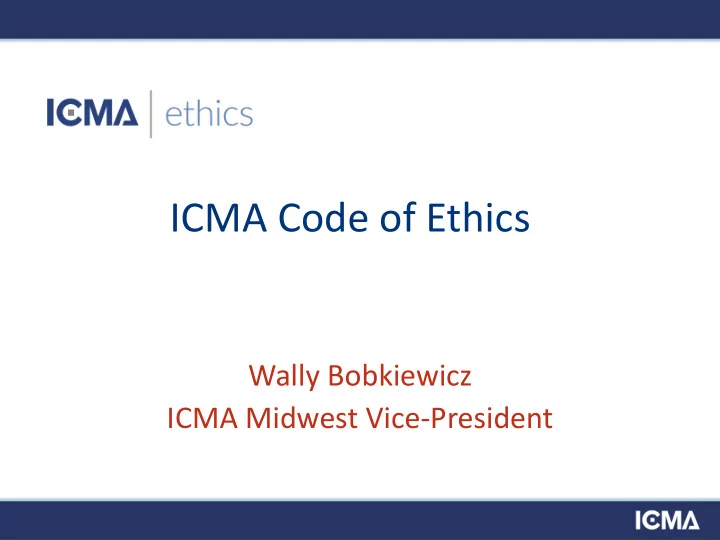

ICMA Code of Ethics Wally Bobkiewicz ICMA Midwest Vice-President
Our Mission… To advance professional local government through leadership, management, innovation, and ethics.
The Foundation for the Code of Ethics is ICMA’s Constitution • Establishes the Code • Outlines Enforcement of the Code • Sets Sanctions for Violations of the Code • Outlines How the Code May Be Amended
ICMA Code of Ethics: Origin and Evolution • Adopted by a vote of the membership in 1924 at the ICMA Annual Conference in Montreal. • Amended by Corporate members 10 times. Three of those changes have occurred in the last several years as part of the comprehensive review initiated in 2013.
ICMA Code of Ethics: Origin and Evolution • Designed for the Practitioner • The Code: – 12 Tenet that outline the principles such as integrity, political neutrality, trust, etc. – Guidelines assist members in applying the principles or tenets of the Code. • Changes to the Code approved by Full/Corporate members • Guidelines are approved by the ICMA Executive Board upon input from the members and recommendations from the ICMA Committee on Professional Conduct.
ICMA Rules of Procedure • The Rules of Procedure for Enforcement of the Code govern the entire process for reviewing the ethical conduct of all members. • First adopted in 1962 • Major refinement in 1975 – Added sections to address identified gaps – Effort to clarify jurisdiction, i.e. who was covered
1976 Defined Who is Covered “All members of ICMA are subject to the Code of Ethics and are subject to sanctions for any violations thereof which occur during their membership. However, affiliate members and members not in service are subject only to Tenets 1 and 3. A member may be subject to sanctions for a violation which continues while he or she is a member even though the conduct in question originated prior to admission to membership.”
Today’s definition “All members of ICMA in active service to a local government are subject to the Code of Ethics and are subject to sanctions for any violations thereof which occur during their membership. However, elected officials are not subject to Tenet 7, and members not in service are subject only to Tenets 1 and 3 . A member may be subject to sanctions for a violation which continues while he or she is a member even though the conduct in question originated prior to admission to membership.”
Who is covered by which Tenets • All members working for a local government and members in transition: ▪ All 12 Tenets • Life members, elected officials, students, consultants, retirees, honorary: ▪ Tenets 1 and 3
Elected Officials ICMA Members • Joins ICMA as an elected official – Affiliate member: Cannot vote or serve on the Board – They don’t meet the 1 st criteria for Full/Corporate membership: Occupies a position that is appointed by an elected representative or representatives and is directly responsible to an elected representative and/or representatives.” – Only 7 of these elected officials are ICMA members
Elected Officials ICMA Members • Joined ICMA as a local government professional – Full/Corporate: If they served as an CAO/Assistant, retain the right to vote; can’t serve on the Board – Affiliate: If they didn’t meet the criteria for Full/Corporate, cannot vote or serve on the Board.
Why Be Inclusive? • Our mission is to advance professional management in all forms of government • Mayors serve administrative functions in mayor-council structures • Way to introduce professional management concepts – ICMA’s work in the Philippines
Voting and Board Service Qualifications • Only Full/Corporate members can vote • Only Full/Corporate members working for a local government are eligible to serve on the Board.
Qualifications for Full/Corporate Membership • CAO/Assistant: Meets the 6 criteria established by the Board – #1 Appointed to the position by a governing body or elected official. • Others who report to the above and have senior administrative responsibilities
What regulations cover ICMA staff? • Only covered by the ICMA Code of Ethics if they were a member when joining ICMA • Otherwise covered by the ICMA Code of Conduct
Personal Advocacy of Issues. “Members share with their fellow citizens the right and responsibility to voice their opinion on public issues. Members may advocate for issues of personal interest only when doing so does not conflict with the performance of their official duties.”
Navigating the Grey Area • Conduct that otherwise violates the Code is off limits • ICMA Committee on Professional Conduct will be issuing more advice
ICMA Resources Questions ?
Recommend
More recommend